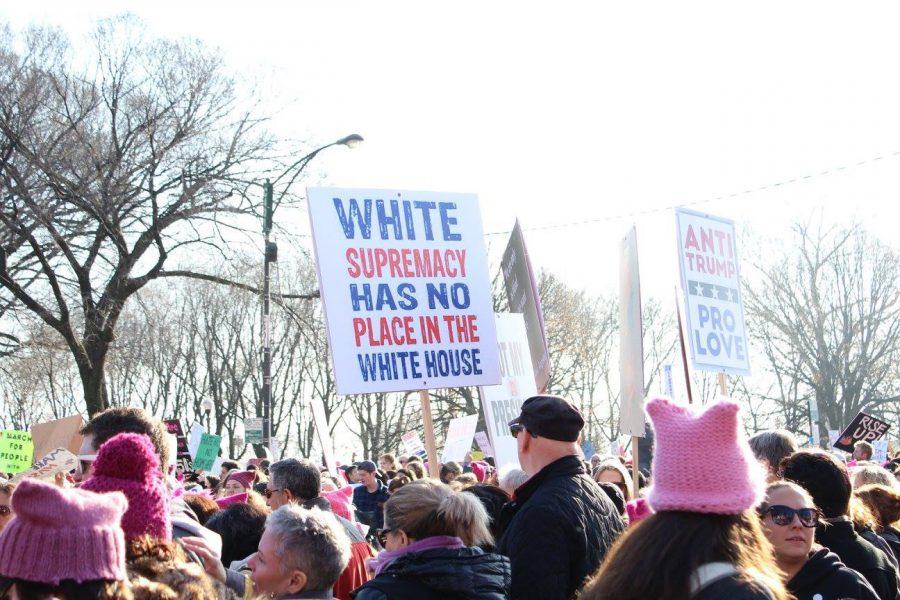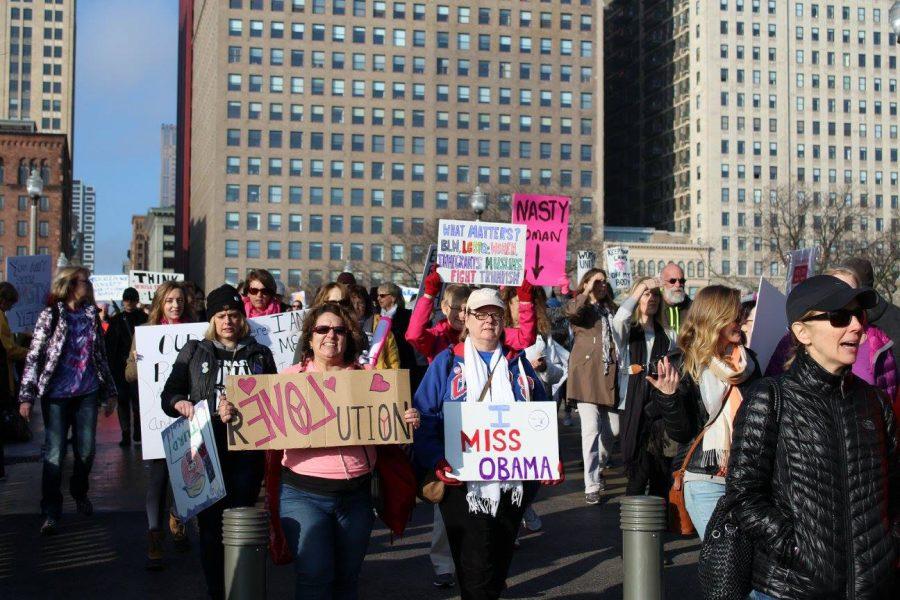Raising their voices
PNW students join estimated 250,000 at Chicago Women’s March
People gather to protest for women’s rights and equality for all in Grant park at the Women’s March in Chicago on Saturday, Jan. 21.
“We will not consent. Donald Trump is not our president,” was one of the many rallying cries heard from the estimated 250,000 protestors at the Women’s March in Chicago on Saturday, the day after the inauguration of Trump as the U.S.’s 45th President.
In addition to a group of PNW students from the Social Justice Club who organized a carpool to partake in the protest, various students attended the march independently as well.
Christian Lutes, communication graduate student, said she thinks it is important to stand up for the civil liberties of all Americans and to condemn behavior that contradicts the values of our nation, even if the message is coming from those in power.
“It was amazing to be a part of such a historic moment. We were a part of the largest protest in American history,” Lutes said.
With an initial projected turnout of 50,000 people, the official, planned march through the Loop was cancelled due to the massive influx of those who wanted to make it clear that they will not stand for sexism, racism or oppression of any kind despite a newly inaugurated administration that has expressed controversial views on matters such as women’s rights, LGBT rights and immigration.
Dominique Newman, also a communication graduate student, said she attended the Women’s March because she is disturbed by the election of a president that has, both with actions and words, disrespected women, minorities and others.
“I have a teenage daughter who happens to be biracial, and I took her and her friend because I want them to know that Trump’s actions and words are not okay,” Newman said. “For me, the most memorable moment was my teenage daughter and her friend holding their signs high and proud in the street.”
The cancellation of the officially planned march, word of which was quickly spread throughout the crowd, did not stop the troves of protestors from taking to the streets and marching anyway. Newman said there were a few moments when she wondered how they would make it out of the massive crowd and to the train station, but that she did not witness anything that caused her to fear a particular person in any way.
“After the march was cancelled, we marched anyway. We marched peacefully, working with police and city officials to Millennium Park, where the crowd swelled and dispersed,” Lutes said. “I think that was when the realization hit me that so many had marched in solidarity with women around the world.”
As women, men, children and even the elderly were packed in Grant Park shoulder-to-shoulder like sardines in a can, the crowd was entertained by various musical performances and inspired by numerous speakers speaking on behalf of women’s rights and equality for all. Signs advocating for equality, ranging from humorous to vulgar, littered the sea of peaceful protestors.
“The diversity of the enormous crowd that came together was striking. The plethora of signs gave women a voice and a way to communicate to our new president that misogyny will be tolerated by this nation,” Newman said. “It was peaceful, organized and a truly patriotic experience.”
The Women’s March in Chicago was just one of many marches on Saturday, following the lead of the protest which took place in Washington, D.C., with other notable marches taking place in New York, Los Angeles and Boston. In total, organizers estimate a turnout of nearly 5 million people.
“I suspect and hope that yesterday was the beginning of a movement in this nation, and perhaps globally, to acknowledge that sexism, racism and so many other forms of bigotry still exist both institutionally and at an individual level,” Newman said. “I think the turnout in Chicago and so many other places were a great encouragement to those who felt the election of Trump was an indication that the majority of people in this nation don’t care about equality.”
Lutes said she was pleasantly shocked to see so many people marching in solidarity with women and minority communities throughout the country.
“I think that the world and current administration can see that we, the American people, and others around the world are not happy with what has been suggested for current and future legislation,” Lutes said. “I thought it was inspirational. A fantastic metaphor for the people taking power when others say they cannot. ‘Do not speak truth to power, but speak truth to social power.’”
Photo gallery: PNW students join estimated 250,000 at Chicago Women’s March






